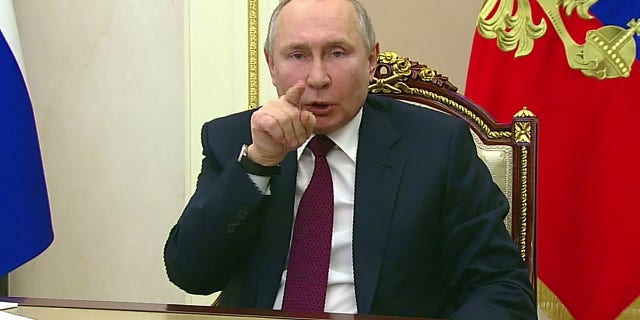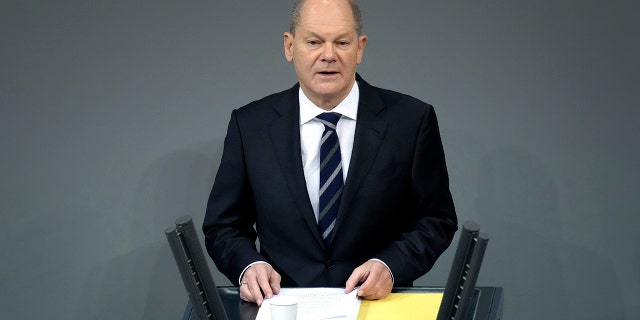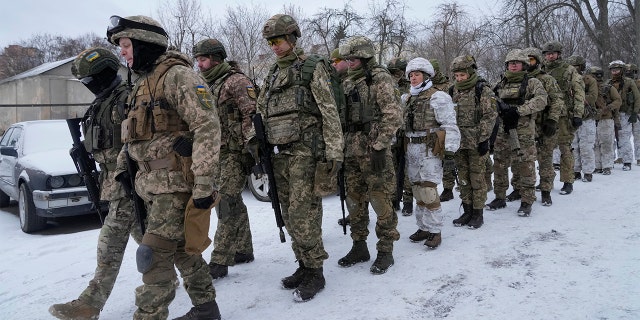NEWYou can now listen to Fox News articles!
The U.S. and NATO remain at a diplomatic impasse with Russia as the Kremlin has yet to make any moves in dismantling its 100,000-strong troop buildup along Ukraine’s border.
Secretary of State Antony Blinken told reporters Friday that he made clear to Russian Foreign Minister Sergie Lavrov that Russia has a choice when it comes to avoiding conflict with the U.S. and NATO.
“You can choose the path of diplomacy that can lead to peace and security or the path that will lead only to conflict, severe consequences and international condemnation,” Blinken said.
Secretary of State Antony Blinken greets Russian Foreign Minister Sergey Lavrov before their meeting, Friday, Jan. 21, 2022, in Geneva, Switzerland.
(AP Photo/Alex Brandon, Pool)
But while the secretary’s comments held a steadfast tone, experts argue the Biden administration needs to improve its messaging – starting with the president.
“Every time President Biden stands up in front of the bully pulpit he’s got to remind the world of all the bad stuff that Russia has done in complete violation of internationally recognized norms,” Former CIA Moscow station chief Dan Hoffman told Fox News.
“You’re threatening Ukraine,” he continued. “And let’s not forget you annexed Crimea illegally, you launched attacks in Donbas illegally, you shot down a Malaysian airliner, not to mention all the other nefarious stuff the Russians have done.
“Have we done enough? I don’t know,” Hoffman said. “What does it take to deter Vladimir Putin from a further attack – that’s the million-dollar question.”
The U.S. and its western allies have called on the Kremlin to abandon its aggressive posture along Ukraine’s border or face steep economic blowback.
Russian President Vladimir Putin has in turn made his own demands, calling for guarantees that Kyiv will be barred from NATO and that no strategic weapons will be placed in Ukraine.

Putin, in the wake of Biden’s comments, says Russia knows “how to defend our own interests.”
(Reuters)
The U.S. and NATO have rejected a flat ban on Ukraine’s admittance into the 30-nation alliance, but Biden suggested this week a deal could potentially be reached on the placement of strategic weapons in Eastern Europe.
Foreign policy expert and senior fellow for the Hudson Institute, Peter Rough, echoed Hoffman’s calls for improved messaging from the Biden administration and told Fox News, “This is a moment that calls for American leadership.”
“If we left Ukraine to the Europeans alone, I think Putin would probably be breakfasting in Kyiv by Tuesday,” he said. “It really does need to be an American leadership role to…coordinate the response.”
UKRAINE CRISIS HIGHLIGHTS GERMAN DEPENDENCE ON RUSSIAN OIL
NATO members, including the U.K. and U.S. have deployed tactical defense weaponry to Ukraine in an attempt to dissuade a Russian invasion and to bolster Kyiv’s ability to respond militarily.
The Biden administration announced this week that an additional $200 million will be provided to Ukraine for defensive military aid, and the State Department authorized the transfer of U.S.-made missiles from Baltic NATO member nations.
Germany has caused some to question its determination to stand united with NATO against Russia.

German Chancellor Olaf Scholz delivers a speech during a meeting of the German federal parliament, Bundestag, at the Reichstag building in Berlin, Germany, Wednesday, Dec. 15, 2021.
(AP Photo/Michael Sohn)
And its refusal this week to send arms to Kyiv prompted Ukrainian foreign minister Dmytro Kuleba on Saturday to accuse Berlin of “encouraging” Putin.
Rough, who focuses on U.S-European foreign policy, pointed out that the biggest economic powerhouse in Europe is Germany, but he also noted it is a “military dwarf.”
“They have a lot of economic firepower,” he told Fox News, arguing that Germany needs to stand united with NATO and “be prepared to take steps to raise the pain on Russia economically.”
The foreign policy expert said he did not believe there was much more the U.S. or NATO could do to impact Putin’s decision on whether he will invade Ukraine.
RUSSIA-UKRAINE TENSIONS: FIRST US SHIPMENT OF ‘LETHAL’ AID ARRIVES
“But I do think we can affect his calculations…by showing: A, there’s solidarity in the West. B, there’s going to be economic costs. And C, we’re going to help the Ukrainians militarily in this late stage as much as we can,” Rough added.
Though not all experts agree that NATO or the U.S.’s hands are tied until Russia makes a decision.
A former U.S. national security official who wished to remain anonymous told Fox News they believe a non-military offensive cyber operation “is probably our best instrument.”
“We’re very good at this. We know how to do this. We’ve done it before,” the former official said. “It’s super risky.
“It has to be very surgical and it has to be in such a way that the Russian’s don’t interpret it as a precursor to military action,” the source noted, adding that the risk is it starts a full-blown cyber-war.
“Not all cyber operations are equal,” the former official continued. “The targeting has to be specific. It cannot be military, command and control, or nuclear forces.”

Members of Ukraine’s Territorial Defense Forces, volunteer military units of the Armed Forces, train in a city park in Kyiv, Ukraine, Saturday, Jan. 22, 2022. Dozens of civilians have been joining Ukraine’s army reserves in recent weeks amid fears about Russian invasion.
(AP Photo/Efrem Lukatsky)
Former Deputy Assistant Secretary of Defense for Europe and NATO, Michael Ryan, said there are also precautionary steps that should be set in motion ahead of a Russian invasion.
CLICK HERE TO GET THE FOX NEWS APP
“The first most important thing is for the President to sign the authorization to ship a package of weapons to Ukraine now so that the weapons can arrive in time for the Ukrainian Army to get them out into the field units,” he told Fox News. “The greatest threat to Putin’s invasion is the number of Russian casualties he will suffer.”
“Any weapons soldiers can employ simply and quickly, like Javelin and Stinger, will dramatically increase Russian casualties,” he added, noting that mass-Russian casualties will undermine Putin’s authority at home.